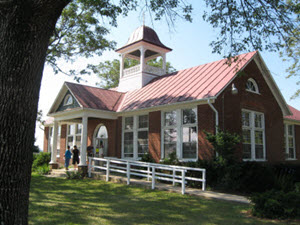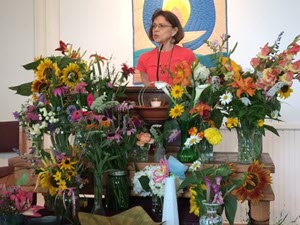
HUU Sermon Archives
Learning To Fall
Presented by Claire Prideaux
April 2, 2006
CHALICE READING [FROM THE INTRODUCTION OF LEARNING TO FALL] "[W]e will one day lose everything. When we learn to fall, we learn that only by letting go our grip on all that we ordinarily find most precious-our achievements, our plans, our loved ones, our very selves-can we find, ultimately, the most profound freedom. In the act of letting go of our lives, we return more fully to them."
TALK - LEARNING TO FALL
For me, the story of Adam and Eve and their fall from grace in the Garden of Eden, rather than establishing original sin, acts as a developmental metaphor for what happens in life. Most of us are born into an "ignorance is bliss" paradise and so we remain for some time. Then, at some point, we fall from innocence into the knowledge of good and evil.
Through our life experiences we learn hard lessons: life is tough, life is not fair, perhaps everyone is capable of murder if not mayhem, you can do your best and still get screwed…. And if we're lucky, we may also learn that when it comes to suffering, there's no way out, no escape hatch…no "get out of suffering" card in the game of life. These and many others are important lessons if we're going to make it through and come out a…live…. We don't get to come out alive now do we?
Because of the various dangers associated with the fall from innocence, parents-if they are even half way adept-make attempts to delay, slow down, and impede this fall so that their children are not exposed to the harshest of life's realities at a tender age. Parents may also act as cushions, being the first soft place where we fall into the arms of someone who both loves and comforts us-someone whose special job it is to help us grieve our painful discoveries and make sense of the bitter that life has to offer as well as the sweet.
Parents take special care with children because if we fall too soon, too fast, or too far, we will likely suffer psychological trauma. Psychological trauma is a fancy phrase for what happens when we encounter a situation where our ability to comprehend and integrate the experience is less than adequate and we are overwhelmed by devastatingly painful feelings. Typically, the mind rebels and painful feelings are stuffed, numbness sets in, and suffering is put off for another day.
Having fallen down into the mud of Complex Post Traumatic Stress Disorder and Chronic Fatigue Syndrome, I know a little bit about trauma, the affects of delayed suffering, searching for escape hatches, and more about falling than I ever imagined possible. Through this often difficult time, I have found comfort in not only the soft place created by the arms of Michele-my greatest comfort-but also in the writings of a man who, when I first began to read him, was dying of Lou Gehrig's disease.
Trauma or not, none of us escapes this life without heartbreak, and so the question becomes: How do we rescue joy from heartbreak while in the act of falling to our inevitable deaths? Phillip Simmons' Learning To Fall, The Blessings of an Imperfect Life offers some reminders on the art of how to live while dying.
If Booklist is at all prophetic when it said "Learning To Fall may become a spiritual classic," then any serious reader of spiritual classics will eventually read him. For that reason, I thought I'd share with you an edited version of the first essay in Philip Simmons' illuminating book and give you an earful of Learning To Fall. So imagine if you will that you are sitting in a Unitarian Church in New Hampshire and I am Philip Simmons, a member of your congregation, and a 38-year-old man with a tidy, dark beard….
[The reader is directed to the first (and also unedited) essay entitled "Learning To Fall" in Philip Simmons' Learning To Fall, The Blessings of an Imperfect Life to learn why "life is not a problem to be solved" and to learn more about the victory of falling: that is, "When we learn to fall we learn to accept the vulnerability that is our human endowment, the cost of walking upright on the earth."]
I-Claire-will end today's talk where I began with words from the Introduction of Learning To Fall. "Life is both more and less than we hoped for, both more comic and tragic than we knew. Comedy ends in happiness, while tragedy yields wisdom. We want, I suppose, to be happily wise and wisely happy: Only then can we know the full blessings of our imperfect lives."
BENEDICTION
Engaged as we are in "the harrowing business of rescuing joy from heartbreak," may we know that we fall together into "the full blessings of our imperfect lives."
For the latest sermons and events at HUU, visit our Community Cafe.
Inclement
Weather Policy
Worship
Service Materials


UUs on YouTube
Our denomination has an official presence on YouTube! The Unitarian Universalist Association's YouTube site includes several videos and lots of interesting commentary.
Harrisonburg Unitarian Universalists 4101 Rawley Pike | Harrisonburg,
VA 22801
Mailing Address: | PO Box 96 | Harrisonburg, VA 22803
| (540) 867-0073 | Webmaster
HUU is a member of the Southern
Region of the Unitarian Universalist
Association
Privacy Policy &
Disclaimer
Site Design & Maintainence : Expression
Web Tutorials & Templates


